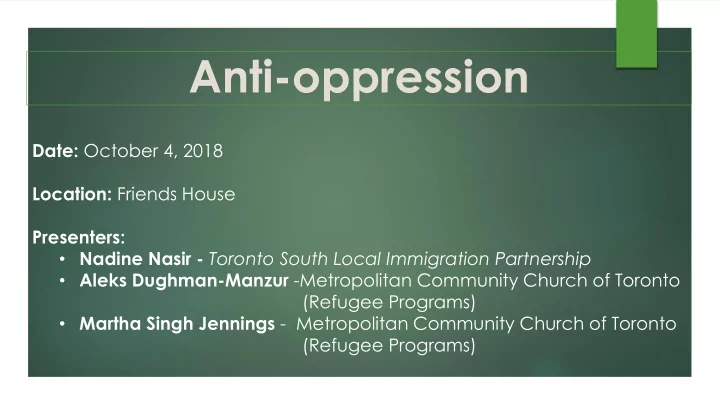

Anti-oppression Date: October 4, 2018 Location: Friends House Presenters: • Nadine Nasir - Toronto South Local Immigration Partnership • Aleks Dughman-Manzur -Metropolitan Community Church of Toronto (Refugee Programs) • Martha Singh Jennings - Metropolitan Community Church of Toronto (Refugee Programs)
Agenda Video & Exercise Self-reflection MCC Toronto’s Refugee Programs Presentation Exploring identity Understanding oppression & anti-oppression Allyship Exercise Self-reflection & Commitment Setting
Video Boonaa Mohammed “Green Card” https://www.youtube.com /watch?v=-Th04ZQCt5A http://boonaa.com/
Exercise 1. Read the highlighted quote. 2. As a group, create ONE sentence that describes how every single person in your group feels about the quote. Everyone must agree with the sentence . This is a “silent discussion”. Participants cannot speak to each other.
Circles of Self Who are you? What identities do you carry? Please fill in as many circles as you wish with your various “identities.”
Identities “who you are, the way you think about yourself, the way you are viewed by the world and the characteristics that define you” – Your Dictionary
Examples of Identity Categories Gender Ethnicity Ability Other: - Worker - Sister - Student Race - Trauma Identity survivor - Care taker - Activist - Etc. Religion/ Socioeconomic Sexuality Spirituality status
OPPRESSION The systemic mistreatment and marginalization of people based solely on their membership in an identity group. Oppression is institutionalized, historically formed, and perpetuated over time.
Identity & Oppression Assumed “Other” Oppression Assumed Form of based on… Standard (marginalized) Discrimination (mainstream) Race White Indigenous, Black, People Racism of color, biracial/multi-racial Gender Male, cisgender Female, transgender, Sexism, gender-nonconforming, Misogyny, genderfluid Transphobia Class Middle/upper class Working class, poor Classism Ability Able-bodied or non- Disabled Ableism disabled Sexual Heterosexual Homosexual, bisexual, Homophobia, Orientation queer Biphobia
POWER Possession of control, authority, or influence over others. Includes: The ability to influence others The ability to enforce your own beliefs, or affect situations to your benefit
Power Imbalance Service Providers Newcomers
PRIVILEGE The unearned advantages that members of a dominant group receive because of their membership to that group. When a system of oppression marginalizes and oppresses one group, it empowers another group. Privilege often seems invisible to those who have it.
PREJUDICE A conscious or unconscious negative belief about a whole group of people and its individual members.
PREJUDICE POWER
DISCRIMINATION The act of denying a person of opportunities, resources, or access because of their membership to a particular group. The person discriminating has POWER to deny opportunities, resources, or access.
OPPRESSION The systemic mistreatment and marginalization of people based solely on their membership in an identity group. Oppression is institutionalized, historically formed, and perpetuated over time. Again, POWER is needed to “mistreat” and “marginalize”
Levels of Oppression Personal: Actions or behaviours rooted in prejudice.
Levels of Oppression Institutional: Conscious: Oppression is maintained through social institutions that are specifically designed to marginalize or disempower Unconscious: Oppression is maintained through social institutions unintentionally, because institutions are built by people who hold underlying prejudices and are influenced by oppressive cultural norms.
Levels of Oppression Cultural: Oppression is maintained through the cultural perspectives of the dominant group, which is imposed on individuals and institutions.
Levels of Oppression Personal Institutional Cultural
ALLYSHIP An active and consistent practice of unlearning and re-evaluating, in which a person of privilege seeks to operate in solidarity with a marginalized group of people.
Allyship Exercise 1. Watch the Skit 2. Consider how the Settlement Worker could have been a better ally 3. The skit will run again. Change the Settlement Worker’s script by shouting out suggestions about how she could be a better ally.
Self-reflection and Commitment Setting 1. Add identities that may have come to mind during the workshop 2. Mark the categories that give you privilege with a star 3. Identify how you can use your privilege to affect positive change within your organization or sector. 4. List any identities that you are unfamiliar with, and wish to learn more about to be a better ally.
Train the Trainer Presentation Anti-oppression Date: October 4, 2018 Location: Friends House Presenters: • Nadine Nasir, Toronto South Local Immigration Partnership • Aleks Dughman-Manzur , Metropolitan Community Church of Toronto (Refugee Programs) • Martha Singh Jennings , Metropolitan Community Church of Toronto (Refugee Programs)
Identity Categories Gender Ethnicity Ability Other: - Worker - Sister - Student Race - Trauma Identity survivor - Care taker - Activist - Etc. Religion/ Socioeconomic Sexuality Spirituality status
Identity & Oppression Assumed “Other” Oppression Assumed Standard Form of based on… (mainstream) (marginalized) Discrimination Race White Indigenous, Black, People Racism of color, biracial/multi- racial Gender Male, cisgender Female, transgender, Sexism, gender-nonconforming, Misogyny, genderfluid Transphobia Class Middle/upper class Working class, poor Classism Ability Able-bodied or non- Disabled Ableism disabled Sexual Heterosexual Homosexual, bisexual, Homophobia, Orientation queer Biphobia
Power, Privilege & Prejudice Power: Possession of control, authority, or influence over others. Privilege: The unearned advantages that members of a dominant group receive because of their membership to that group. Prejudice: A conscious or unconscious negative belief about a whole group of people and its individual members.
PREJUDICE POWER
Discrimination & Oppression Discrimination: The act of denying a person of opportunities, resources, or access because of their membership to a particular group. Oppression: The systemic mistreatment and marginalization of people based solely on their membership in an identity group. Oppression is institutionalized, historically formed, and perpetuated over time.
Levels of Oppression Personal Institutional Cultural
ALLYSHIP An active and consistent practice of unlearning and re-evaluating, in which a person of privilege seeks to operate in solidarity with a marginalized group of people.
Self-reflection and Commitment Setting 1. Add identities that may have come to mind during the workshop 2. Mark the categories that give you privilege with a star 3. Identify how you can use your privilege to affect positive change within your organization or sector.
Nadine Nasir Adult Educator Toronto South Local Immigration Partnership St. Stephen’s Community House 647-460-1569 nnadine@sschto.ca
Recommend
More recommend